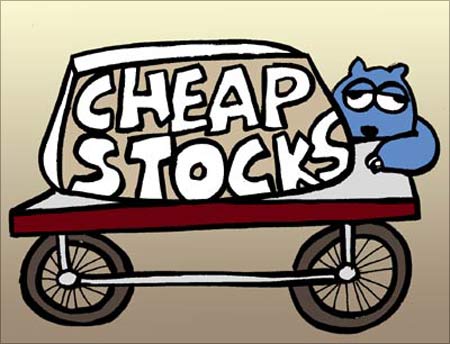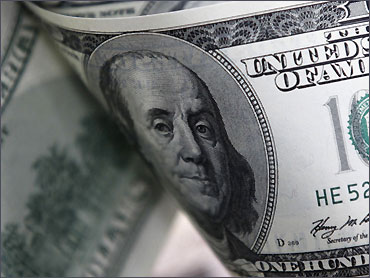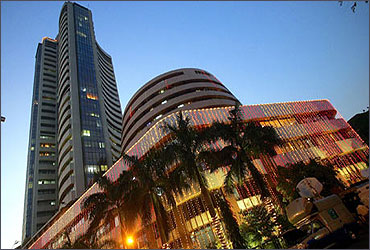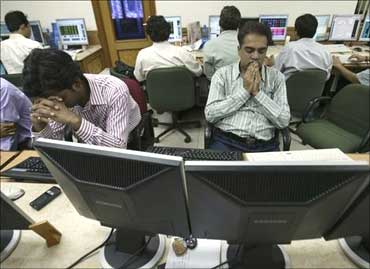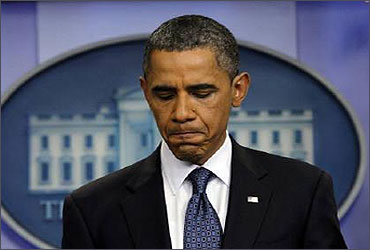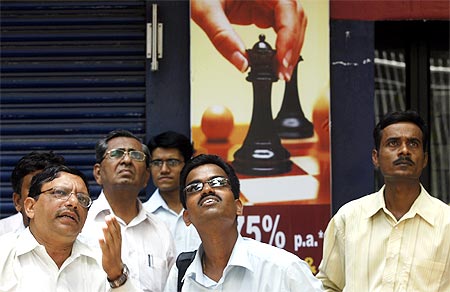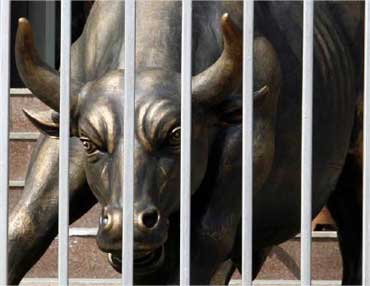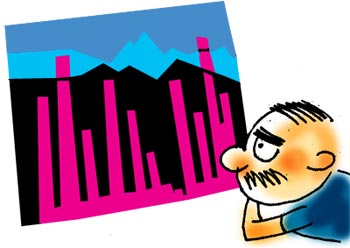 | « Back to article | Print this article |
While all the stock market experts in India were sleeping
The BSE Sensex, India's premier stock market index, opened 405 points or 2.05 per cent lower from Monday's close. Since its close on August 3, 2011, the stock market has fallen around 1,400-odd points.
Late on Friday evening, the credit rating agency Standard and Poor's downgraded United States debt from its most safe AAA status to a rung lower at AA+.
The debt accumulated by the US government is now around $14.3 trillion, or almost around 100 per cent of their current Gross Domestic Product (GDP).
Click NEXT to read on . . .
While all the stock market experts in India were sleeping
The fact is that the US debt-to-GDP ratio did not become so high overnight. So why is the stock market reacting so violently now?
Well, the only answer to this is that the markets do not always function correctly, but eventually they do catch up.
John Mauldin and Jonathan Tepper make this point in their new book Endgame - The End of the Debt Supercyle and How It Changes Everything: "If you get to really high debt levels, you don't make it. The market gets eventually concerned."
Click NEXT to read on . . .
While all the stock market experts in India were sleeping
Experts caught napping, as always
All the newspapers and business news channels on Monday morning told us that the world is now going to change again.
But these very guys had no clue till a few days back, and were gung ho about the Indian economy, the Sensex and pretty much everything else.
Some of them were even talking about the Sensex crossing 21,000 levels by the end of the year.
Click NEXT to read on . . .
While all the stock market experts in India were sleeping
The debt that the US had on Thursday afternoon was as bad as its debt on Friday evening. It took Standard and Poor's downgrade to wake up the so-called experts to the perils of huge debt overhanging the entire developed world.
And now they are talking about Sensex hitting 15,000-odd levels. As the old stock market saying goes, the trend is your friend until the end. Now the trend has ended.
When the trend ends you have television channels saying things like this: 'There have been numerous predictions that mankind would have come to an end in the last 5,000 years but we survived. And anyway if everything does really come to an end, nothing matters anyway...' Whatever that means!
Click NEXT to read on . . .
While all the stock market experts in India were sleeping
The prediction game
In fact, most experts get most predictions wrong. Philip Tetlcok, who used to be a professor at the University of California in Berkley, tested many predictions over a period of 20 years, starting sometime in the mid-1980s.
Tetlock's study had 284 people, whose salaries depended on predicting economic and political trends.
Over a period of 20 years, he asked each one of his experts to make lots of predictions. This included stuff like 'would the dot-com bubble burst'? 'Will apartheid end in South Africa'? 'Will communism end'? 'Will the United States go to war in the Middle East'? So on and so forth.
Click NEXT to read on . . .
While all the stock market experts in India were sleeping
Interestingly, by the time he finished in 2003, he had a total of 82,631 predictions. And his result was that these so called experts were extremely poor at forecasting. This research finding is in line with the anecdotal evidence that is on offer.
As Duncan J Watts writes in Everything is Obvious - Once You Know the Answer 'whether we consider the most spectacular business meltdowns of recent times -- Long Term Capital Management in 1998, Enron in 2001, WorldCom in 2002, the near collapse of the entire financial system in 2008 -- or the spectacular success stories like the rise of Google and Facebook, what is perhaps most striking about them is that virtually nobody seems to have any idea what was about to happen.'
What about the stock market?
This is one of my favourite stock market stories. A couple of days before the Lehman Brothers went bust (on September 15, 2008), and triggered the financial crisis, a big Indian brokerage which hoped to list on the stock exchange, brought out a report stating that the Indian stock market was well poised to touch 25,000 levels soon.
Click NEXT to read on . . .
While all the stock market experts in India were sleeping
This never happened. Now if you are the kind of investor who follows these predictions then you would be the kind who is constantly getting in and out of the stock market, as the experts keep mouthing 'buy' and 'sell'.
This strategy, other than giving eyeballs to experts who make such predictions for a living, only benefits your stock broker.
The numbers clearly point towards this. If you had invested Rs 10,000 in the 30 stocks that comprise the BSE Sensex on January 1, 2001 and stayed invested till June 30, 2011, you would have got Rs 48,000.
Click NEXT to read on . . .
While all the stock market experts in India were sleeping
Now let us say that you like to keep track of what the stock market experts say and keep getting in and getting out of the market, depending on what the experts are predicting and, say, you miss out on the 10 best days of the stock market.
Your Rs 10,000 would have been worth Rs 22,000, or less than half of what you would have made with a simple 'buy and hold' strategy.
What happens if you miss out on the 25 best days? Then you end up with Rs 11,000. You would have simply been better off by depositing the money even in a savings bank account and forgetting about it.
Click NEXT to read on . . .
While all the stock market experts in India were sleeping
What do you learn from this?
Let us take a look at this study carried by Invesco in context of the stock markets in the United States. Every one dollar invested in the S&P 500, a stock market index, in the year 1928 and held on till 2009, would be worth $45.
But if you were trying to constantly get in and get out of the stock market and missed the 10 best days, you would end up with a much lower $15.
What is interesting is that in case of the US all the biggest gains in the US stock market came during the middle of the Great Depression that followed the stock market crash of 1929, as well as the current financial crisis.
Click NEXT to read on . . .
While all the stock market experts in India were sleeping
In the Indian context, half of the biggest gains came after the stock market crashed in September 2008, after the investment bank Lehman Brothers went bust.
Now, as you would agree, this was the time when the bear market was officially on and the experts were out with 'stay away from the stock market' signs everywhere.
So what we learn from this is rather ironic. Trying to figure out which way the stock market is headed is detrimental to an investor, as chances are that he or she may miss out on the best days of the stock market.
The author can be reached at shonalee.biswas@gmail.com
